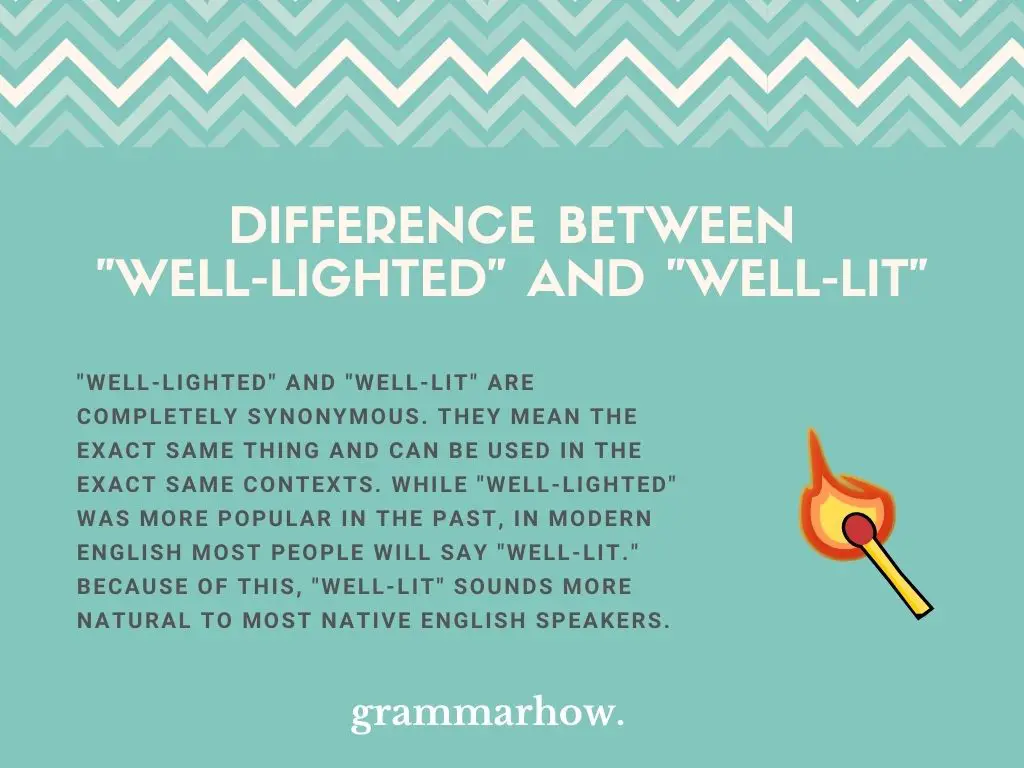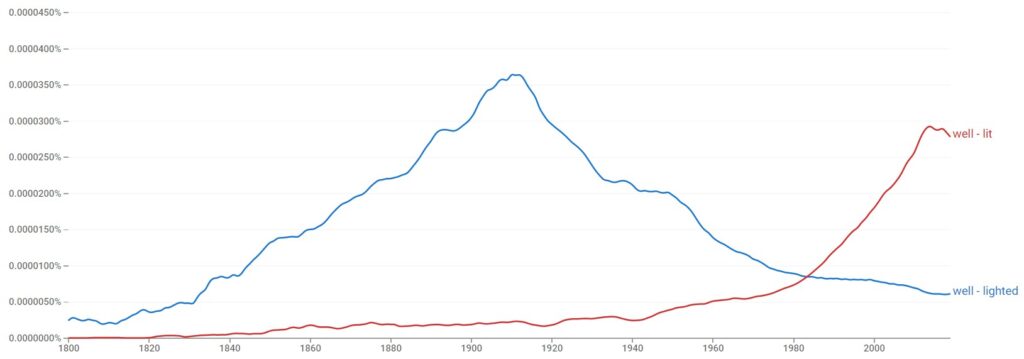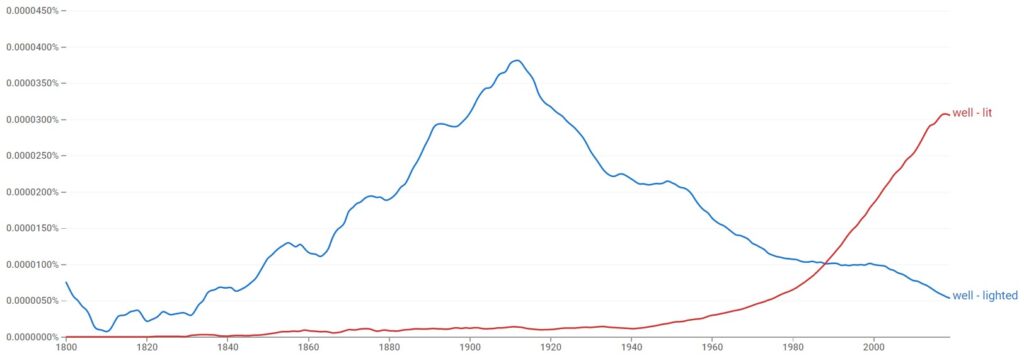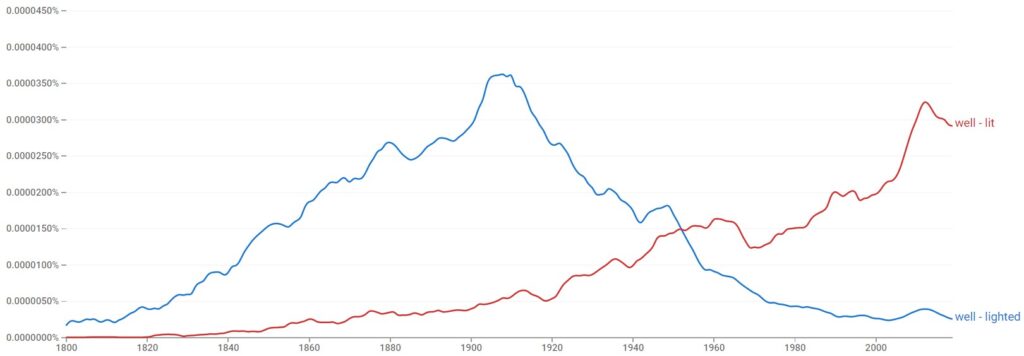Many people would describe something adequately illuminated as “well-lit.” But you might have seen many authors instead saying “well-lighted.” Is there a difference? Which one should you use? This article will break down everything you need to know to use “well-lit” and “well-lighted.”
What Is The Difference Between “Well-Lighted” And “Well-Lit”?
“Well-lighted” and “well-lit” are completely synonymous. They mean the exact same thing and can be used in the exact same contexts. While “well-lighted” was more popular in the past, in modern English most people will say “well-lit.” Because of this, “well-lit” sounds more natural to most native English speakers.

Both “lighted” and “lit” are appropriate past tense forms of “light.” For example, the following sentences are both correct:
- The flames lighted up the room.
- The flames lit up the room.
In both examples, “lighted” and “lit” are verbs. The same rules apply when they are used as adjectives, as with “well-lighted” and “well-lit.”
“Well-lit” and “well-lighted” are adjectives that can be used to describe things or areas that have sufficient or aesthetically pleasing lighting. For example, a theater stage that is described as “well-lit” could be adequately illuminated or have beautiful lighting design.
People who aren’t used to hearing “well-lighted” may think it sounds strange, and vice versa. For the most part, the difference comes down to popularity.
Is “Well-Lighted” Or “Well-Lit” Used The Most?
According to Google Ngram Viewer, “well-lit” is significantly more common than “well-lighted.”

Notice, however, that “well-lit” didn’t start becoming popular until the mid-20th century. Before this, “well-lit” was rarely used.
Prior to about 1930, “well-lighted” was more common than “well-lit.” At its peak, “well-lighted” was more popular than “well-lit” is today.
This is actually fairly unusual in English, so it makes sense that a lot of people would be confused by it.
This is unusual because “lit” is an irregular verb — a verb that doesn’t end with “-ed.” “Lighted” is a regular verb. The general trend in English is that over time irregular verbs become regular. English used to have more irregular verbs than it has now, but many have shifted to “-ed” verbs.
With the past tense of “light,” the opposite happened. The irregular form overtook the regular form in popularity, but both forms remained in common usage.
Is “Well-Lighted” And “Well-Lit” Used Differently In American English And British English?
“Well-lit” is more common than “well-lighted” in both American English and British English.
Let’s take another look at Google Ngram Viewer. Here is the graph for American English:

Here is the graph for British English:

In both British English and American English, “well-lit” is significantly more common in modern usage than “well-lighted.” Both graphs also show that “well-lighted” used to be the preferred option.
The key difference these graphs show is that British English adopted the use of “well-lit” before American English did. In British English, “well-lit” surpassed “well-lighted” in the early 1950s. That change didn’t happen in American English until the late 1980s.
So between about 1955 and 1990, “well-lit” was used in British English while “well-lighted” was used in American English. As such, if you’re looking at a media or academic source produced before the 1950s, it would likely use “well-lighted” instead of “well-lit.”
In the modern day, however, both British English and American English prefer “well-lit.”
Examples Of How To Use “Well-Lighted” In A Sentence
Here are some ways you could use “well-lighted” in a sentence.
- The stage is well-lighted and beautifully decorated.
- You should only use power tools in well-lighted, well-ventilated areas.
- The streets were well-lighted, but she still didn’t like the idea of walking alone at night.
- I prefer to work in well-lighted places.
- Her previous home had been dark and drab, so she was excited to find a new place that was so well-lighted.
- It’s not very well-lighted at the moment, but we’re getting more lights in sometime this week.
- The large windows made for a well-lighted space.
- He was unused to the well-lighted sidewalks of the city.
- He would have preferred taking the well-lighted path, but his friends insisted the other path was quicker.
- The show was incredibly well-lighted. The lighting designer deserves some recognition!
- The students loved having class in the well-lighted courtyard.
- He preferred the dim alleys to the well-lighted streets.
- The Christmas tree was well-lighted, brightening up the entire courtyard.
- Her apartment wasn’t terribly well-lighted, but it didn’t bother her.
- Old buildings aren’t often well-lighted, so she wasn’t surprised by how dark it was inside her new office.
Examples Of How To Use “Well-Lit” In A Sentence
As explained above, “well-lit” and “well-lighted” are completely interchangeable. So we’re going to show you what “well-lit” looks like in some of the examples sentences above as well as provide some unique examples.
- The stage is well-lit and beautifully decorated.
- You should only use power tools in well-lit, well-ventilated areas.
- The streets were well-lit, but she still didn’t like the idea of walking alone at night.
- I prefer to work in well-lit places.
- The parking lot needs to be well-lit and well-maintained with clearly-marked handicap spaces.
- Public transit stops need to be kept clean and well-lit.
- The clearing was well-lit by the afternoon sun.
- The room was well-lit, but she couldn’t find a light source.
- If the city wants to promote cycling it needs to provide well-lit bike lanes that are free of obstacles.
- The streets in this part of town weren’t as well-lit as she was used to.
- The hotel lobby was neat and well-lit, a huge contrast to the motel they’d stayed in the previous night.
- Constantly moving between well-lit and dimply-lit areas can cause eye strain.
- The studio was large and well-lit, perfect for the dance film she was producing.
- Her office was well-lit by the large windows.
- Unlike many other old buildings, the capitol building was both well-lit and well-ventilated.
Should I Use A Hyphen With “Well-Lighted” And “Well-Lit”?
There are no rules in English that state you have to use a hyphen to connect compound modifiers like “well-lit” and “well-lighted.” Grammarians are split on the subject, so whether or not you use a hyphen comes down to personal preference or the style guide you’re writing needs to follow.
A compound modifier is two words that are acting as a single adjective. For example, “well-liked,” “rock-hard,” and “load-bearing.” Whether or not the hyphen should be used is a matter of much debate.
Many grammarians hold that a hyphen in a compound modifier is unnecessary, while others maintain that the hyphen should always be included for clarity. Some fall right in the middle, maintaining that a hyphen should only be included if the sentence is confusing without it.
In the case of compound modifiers that start with “well,” some argue that they should always include a hyphen as they almost always create a phrase that would mean something different if the “well” were dropped.
For example, “well-lit” doesn’t mean the same thing as “lit.” ‘Well-intentioned” doesn’t mean the same thing as intentioned. As “well” is vital to clarity, it makes sense to hyphenate. But again, this isn’t a rule.
Different style guides have different rules as to when to use a hyphen in a compound modifier.
AP Style, for example, recommends you always use a hyphen for the sake of clarity and consistency. Chicago Style, on the other hand, sees hyphens as unnecessary.
So “well-lit” and “well-lighted” are correct in AP Style, but in Chicago Style it should be “well lit” and “well lighted.”
So if you’re not sure if to use a hyphen, first consult whatever style guide you need to follow. If you’re not following a style guide, it comes down to preference and clarity.
“Well-Lighted” And “Well-Lit” – Synonyms
Here are some words and phrases that mean roughly the same thing as “well-lit” and “well-lighted.”
- Bright: The room was bright with sunlight.
- Brightly-lit: The stage was brightly-lit.
- Illuminated: The night was illuminated by the stars and the moon.
- Well-illuminated: The once dark streets were now well-illuminated by electric street lights.
- Full of light: The room was clean and full of light.
- Aglow: His backyard was aglow with dozens of multi-colored hanging lanterns.
- Sunlit: She spent all of her lunch breaks reading in the sunlit courtyard.
- Sunny: He enjoyed his daily walks down the sunny streets.
- Beautifully lit: The streets were beautifully lit with brightly-colored lanterns.
